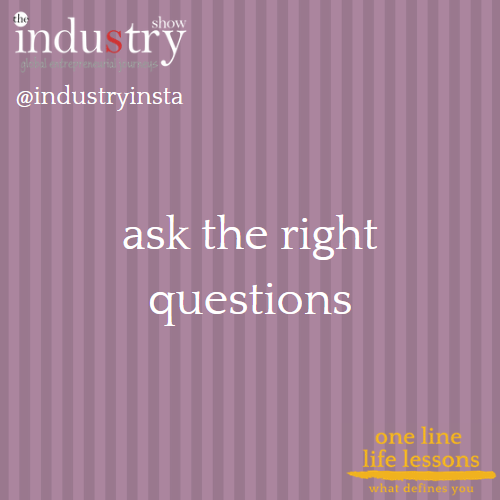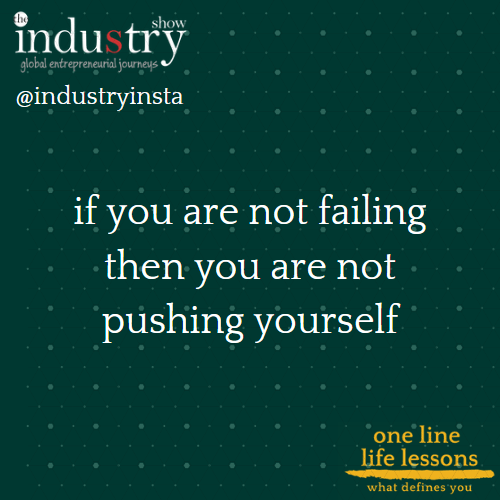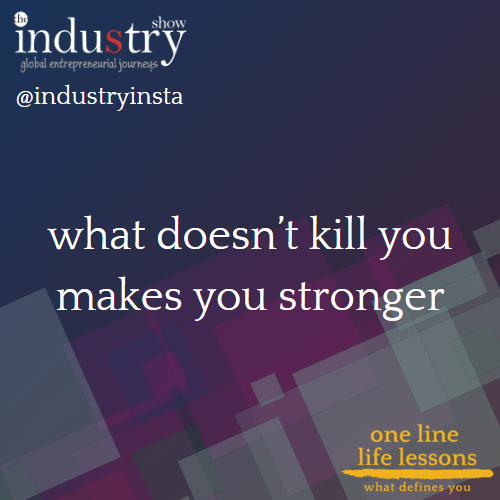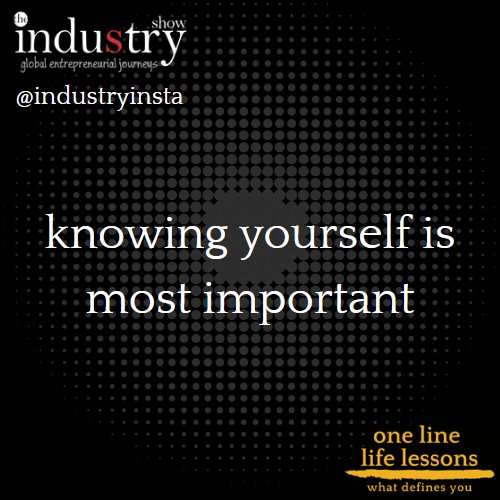oct 30, 2022
Sud Bhatija
Sud Bhatija is the Co-Founder and Head of Growth at Spot AI, a groundbreaking video intelligence company. Sud is recognized as a Forbes Cloud 100 Rising Star and featured in a launch story in TechCrunch. Spot AI has attracted thousands of customers – major manufacturers, nationwide retailers, automotive businesses and beyond.
One Line Life Lessons from Sud





Episode Highlights
- 00:30 – Sud Bhatija shares his journey from a middle-class family in Bombay to Silicon Valley.
- 03:15 – Discusses how his background in physics has influenced his approach to business.
- 06:45 – Talks about the creation of Spot AI, a company focused on using visual technology for businesses.
- 09:20 – Describes the company’s AI camera system aimed at identifying and resolving operational issues.
- 12:10 – Emphasizes the challenges and successes of building the company and the importance of building an effective organization.
- 15:40 – Highlights the significance of learning from failures and understanding oneself.
- 18:05 – Stresses the importance of asking the right questions to find the right answers.
Show Transcript
Transcript - Full Episode
Nitin Bajaj
Hey, everyone. Welcome to the industry show. I’m your host, Nitin Bajaj, and joining me today is Sud Bhatija. Sud, welcome on the show.
Sud Bhatija
Hi, Nitin. Really excited to be here.
Nitin Bajaj
Great to have you here. Let’s start with who is, Sud?
Sud Bhatija
So Sud is an entrepreneur. I grew up in a middle class family in Bombay. I was actually trained as a physicist, but then I decided to go into business. And what motivated me to do that was that I I found the business to be a tremendous way where, there was an opportunity to create value at scale. This whole the the mechanics of the of industrialist of industrial capitalist society allowed, you know, for you as a business owner to solve a problem that is valuable to others and create, you know, scale with it.
Nitin Bajaj
Mhmm.
Sud Bhatija
That idea really attracted me. And, I I was also given, you know, the opportunity and the privilege of a good education and, you know, the freedom to do what I wanted to. And I know that a lot of people don’t have that. And I wanted to do something good with it. So I, after working I started off my career in investment banking and in consulting and then quickly moved over to startups. And in 2015, found my way to Silicon Valley to, Stanford’s graduate program in business. And that’s really where I fell in love with this idea of, the intersection of technology and physical world. And, like a lot of immigrants decided to not worry about student debt and start a business.
Nitin Bajaj
That’s such an amazing story and journey, and I’m sure it’s filled with a lot of twists and turns, including your move from, you know, being trained as a physicist and now being in the heart of Silicon Valley. So let’s talk a little more about that. Tell us what is Spot AI? What is the mission, the vision? Why do you do this, and why do this now?
Sud Bhatija
Sure. So, you know, the the interesting thing about being a physicist now, let me start there for a second, is it teaches you how to look at the world, through first principles and think in first principles and, almost to a far question everything until you understand every piece of it. And and that’s definitely worked both ways for me in business, but I think it definitely helped more than it hasn’t. It also helped us with it helped me, you know, to identify this opportunity, and, you know, my business partners came to it in different ways. The the mission of Spot AI is to create a safer and smarter physical world with the power of sight. And the the core premise of that is that the physical world of business is just very complex. Right? There’s just a lot of movement of people, vehicles, and things. And then problems have a way of surfacing in businesses and often by surprise. And suddenly, what feels like a really smooth day now descends into this frantic firefight.
Nitin Bajaj
Mhmm.
Sud Bhatija
And, you know, if you think about visual sight and visual context, right, seeing is 90% of sensory perception and people say that the an image is worth a 1000 words. Right? Finding and solving problems in business requires that visual context. So the mission of the business is to help shed the light on the physical world of different businesses so that, you know, business owners and operators and professionals can make better decisions and, you know, keep their businesses moving. And what that translates today, in terms of product is, you know, we build this AI camera system that allows businesses to instantly surface and resolve problems in their operations. The reason it’s relevant and now is there’s a combination of two trends that we saw happening that intersecting together cleared a large business opportunity. 1 is that people video is becoming a huge deal in the consumer world in general. And the technology to be able to transmit process video is becoming a huge deal. And, it was a medium that people were really picking up and getting to communicating with, because it’s so rich in itself. So the question that we asked ourselves on the back of this sort of behavior change that we were seeing in the consumer world was, well, if people love it so much, why can’t you use it in business? And, you know, given that there’s so much opportunity, you know, it can really solve a lot of problems, which brings us to the other trend that we were seeing, which is the ability to very cheaply and effectively process video at the point at which it’s created, which is the camera itself. Video is a very large data source and moving video from place to place is very expensive. And crunching video and processing video is also very, very expensive. That’s where edge computing comes in and video AI comes in. If you combine both those things, which are evolving at a very rapid pace year on year, you are able to index and analyze video and derive insights from it at a very low cost. And that the combination of both those things is what we saw as a very interesting business opportunity. If you could help people take all the data from all these cameras that they already have and help them make, you know, very easily cheaply process it and help them make decisions with it, it will create business value. And that’s why we, you know, do what we do right now.
Nitin Bajaj
Makes sense. Love it. And, you know, I think the timing is great. I think I’m trying to remember one of the first notes we exchanged. There was there was a bit of a footnote in there that said something along the lines of 19 nineties call and is asking for your video tapes or something. I I can’t remember it, but that maybe you have an interesting quip over there.
Sud Bhatija
Yeah. I mean, it’s it’s interesting. Right? Like, the the number of security cameras in the world has been growing dramatically. There are about a 1000000000 security cameras in the world today. A billion with a b. And there are about a 100,000,000 cameras in the US alone.
Nitin Bajaj
Mhmm.
Sud Bhatija
And the reason and that number is about 2 x what it was just about 7 years ago.
Nitin Bajaj
Yes.
Sud Bhatija
And the reason that happened is because people are using video for all these different things. Mhmm. But the, the technology that they have to be able to, you know, view their video and to access it and to, use it for decision making, for safety, for security, for efficiency is just very, very old. A lot of companies have these very old, you know, NVR network video recorders or even, you know, digital video recorders that, you know, record video. There’s a keyboard, a mouse, and it’s basically, you know, an interface that looks like Windows 95, and you access it by going into some backroom in your office. Right? That’s the technology that’s available today to all these people. And and it’s really unfortunate because in our personal lives, we have so much more. Right? You have YouTube. You have Zoom. You have Hangouts. You have Snapchat, you have TikTok. Right? You have a bunch of different things. And and and, you know, those worlds haven’t met. And that’s the opportunity that we saw to to be able to tap into this need that people have to want to use video but give them modern technology that we as consumers take for granted, but this isn’t available in the business market.
Nitin Bajaj
Love it. And, you know, you started talking about the size of the market. Give us a sense for the size and scale of, your operations at Spot AI. And also what I’m particularly interested in is what’s the impact, whether it’s in terms of revenue or in terms of the market you’ve been able to address, or even if you have been able to create, some sort of within the organizations if there is a story that speaks to that impact.
Sud Bhatija
Yeah. So, you know, the business has scaled, you know, pretty tremendously since we found ProductMarketFit in early 2020. Now we’re a company of, I’d say, nearly a 100 people. As a business, we are deployed across thousands of locations in the US. We serve customers right from small to medium businesses to Fortune 500 companies. Mhmm. We have customers across 17 different verticals that are using video several times a day in their operations to make better decisions. So the and and, you know, that that trajectory of how customers use the product and, you know, why they buy the product is proving that core thesis that we had, which is, like, video is fundamentally a very data source and business centers very useful. And, you know, people are trying to use it more and more.
Nitin Bajaj
Congratulations on that sky scale. It’s pretty amazing. Not surprising at all, given the team that’s behind it, including you. And, tell me about 2 things I’m I’m really curious to know. Very exciting opportunity, but I’m sure there is challenges, as you approach this market, these businesses and your customers. What’s the one big challenge you would like to call out? I think
Sud Bhatija: the biggest challenge that we face and that, let’s say, every particularly start ups face is building an organization. At the end of the day, it’s all about the team and the people that you work with. Mhmm. And and, you know, as as founders, we we front the business and, you know, we talk about the future, but it’s really a word all to our teams who actually do a lot of the work and and and make things happen. So, as any business owner, the the the challenge is how do you find the right people? How do you create a culture in an organization that scales and makes good people want to work here?
Nitin Bajaj
Mhmm.
Sud Bhatija
And then how do you get all those people within that culture to work effectively together? And and what are the processes you put in place? What are the rituals? What are the, like like, how does your company operate? What is your operating cadence? And, so those are the biggest challenges that that that that we face. Right? And and the the we are very grateful to have a phenomenal team and have built that and get full people who have, you know, taken bets on us, but that’s always the biggest challenge that we face. And it’s a challenge that you have to keep solving.
Nitin Bajaj
Yes. And and it’s a great one because when you’re growing, you’re scaling, you’re having these opportunities to go back and look at what worked 6 months ago does not work anymore. On the flip side of challenges come opportunities and I’m curious to hear the most exciting one that’s on your plate right now.
Sud Bhatija
You know, I think I’d say given, how we see our customers using our product and taking up the product, you know, we’re more excited about the market today than Mhmm. We ever have been. You know, if you think about it, structured data, is about a third of business data. And within that realm of structured data, there are ton of companies that have been operating. Right? Whether it’s, you know, everybody from Snowflake to Tableau to Redshift to every single database company to and to BI companies. Video data is actually 2 thirds of business data and nobody has tapped into that. And what we’ve been seeing over the last couple of years in the market as customers have bought and used our product is that when you give people easy access to video to use, to make decisions and you give them insights based on that, they start using a whole lot more of it. So what we see are monthly users of video becoming weekly users and weekly users becoming daily users. Mhmm. And that shift in the market is something that, you know, we think is here to stay and is only going to grow. Video is going to become is the largest source of data in the enterprise and it’s going to eventually become a very large source of insights and value in businesses. And that opportunity is something we’re more excited about today than we ever have been. And, you know, the way we think about it is how do we just get to that end state as fast as possible? How do we get more customers? How do we build products faster? How do we build the right team? So that’s an opportunity that, you know, me and my partners get up every day and are just very, very excited about.
Nitin Bajaj
That’s super exciting. And as we look forward, you know, I think in terms of I agree with your comment. The more easy and more accessible you make something, the use goes up, the opportunities come out of that, and we start wrapping our heads around what’s possible. And then that in itself opens up a lot a lot of new doors. Now as we look forward, I love to take this moment and look back and you know look through your journey, your career, and, I’d like for you to share 2 moments. 1, that was a success that blew your own expectations, and I would urge you to brag a little bit about that. On the flip side of that, an experience that did not work out as you had expected was a failure and became a lesson that changed you for better or worse. So take your pick. Go with go with either one you want to Sure. First.
Sud Bhatija
Go with the go with the failure. I mean, I I I hesitate to call it failure because at the end of the day, there are only learnings. Right? And and as long as
Nitin Bajaj
you Agree 100% with you.
Sud Bhatija
Don’t make the same mistake twice, you’re you’re good. I think I think the the biggest learning particularly on this journey for us for me as well has been the story of how we actually found product market fit. So when we started go to market, the thesis was that we wanted to build a smarter camera. And we spent a little over a year trying to go to different types of businesses and customers selling them that smart camera. And we got the question that customers will keep asking us is, hey, this is cool, but, like, I don’t really want to change my camera. So as very, you know, enthusiastic and, you know, like like and and dogged entrepreneurs, we go to another customer to, you know figure out if they wanted that. And you know in the end we found product market fit when we questioned the very foundational assumption that we had about the business that the product was all about the camera. And then and and when we realized the product was about the software and we heard about software that works with any cameras is when we really found product market fit. And the the lesson that we learned, it was, you know, particularly as an entrepreneur, it’s really important to have confidence in your vision. But I think the the lesson there is that it’s very important to have strong opinions but hold them very weakly because especially when you’re early in a market and you’re, starting a business side, you know a lot less than you don’t know. And I think that realization, it requires you to approach the problem in the world in a certain way where you’re approaching solutions very enthusiastically, but you’re absolutely ready to, let go of them. And what becomes more important is how do you then iterate towards the answer and how much are you learning and how fast are you learning because an iteration has already taken the right answer. Mhmm. So so that sort of experience of 1 year of figuring out where we had to go was the what was that great, you know, like, learning experience in life. And what’s interesting particularly was that, what we ended up doing was actually one of what our one of our first customers toured us. So so that was a very humbling realization.
Nitin Bajaj
Nice, circle nice circle back. So love
Sud Bhatija
that. Circle back. Exactly. And success story, I think I caught a little bit of it, but, you know, what I’m what I’m really proud about and would love to talk about is just, the team we’ve built here. Right? You know, we’re a company that’s growing, you know, 700% every year and, you know, a lot of credit goes to both my cofounders actually. But, you know, we’ve built a strong passionate team of people that, you know, chose to take a bet on us, particularly, you know, the early folk when we didn’t have a whole lot, and said, yeah. Cool. These these guys are cool. We should go work with them. And and we’re, and and and all the folks who have joined us along the way, you know, we are just grateful for their partnership and for them choosing to, you know, be part of this journey with us and and define it. Right? And, you know, they’re people who we learn from every day, and we’re just very proud of that. And and and then so, like, that is the accomplishment that I’m currently most proud of in my life is, you know, just the team and the company we’ve built so far.
Nitin Bajaj
Such a great accomplishment, and it’s so amazing to be surrounded by people that believe in you, trust in you, and vice versa, and makes it so much easier to deal with these challenges that we have to deal with, as a startup, as a business, and just generally in life. So really glad you, found a good group of people that, you love to hang out with Nitin the process, make a a good impact on the business community. Let’s use that as an opportunity to segue into my favorite part of the show. I call it the one line life lessons. Would love to hear some of your life lessons, whether they have come to you through others or through your own experiences, and have come to define how you work, how you think, how you carry yourself in your personal and professional life. So Sure.
Sud Bhatija
Sure. Few that come to mind are, I think one which we just spoke a bit about is there are no failures. There are only learnings.
Nitin Bajaj
Yes.
Sud Bhatija
I think at the at the end of the day, I I like to define myself just not based on the mistakes, but based on how fast I learn from them. And, you know, I get in towards the right answer and sort of
Nitin Bajaj
Mhmm.
Sud Bhatija
And then, you know, getting it right in the end and not about it. It’s not about being right. It’s about getting it right. Yes. So and that’s actually one of the values of the company that that I feel very strongly about. Another one is knowing yourself is probably the most important thing. Like, you never will understand other people if you don’t understand yourself. And, you know, your your own mind and your own behavior is an endless source of learning when it comes to just, like, navigating the world. Right? Because you’re not very different from other people, and they’re not different from you. And and and and if you if you understand that, you learn a lot from people by just, like, learning a lot about yourself. Another one that’s that’s really important is focusing on what you can control. Particularly as a founder, there are many elements that are out of your control, and you’re trying to, you know, almost wrestle with reality, sometimes. But I think the best way to get through that that I found is just focusing on what you’re able to do and what’s in your control and focusing on the process and the problems that you can solve and, just taking it one step at a time. And, you know, there are many things that in a difficult situation you wanna start thinking about, well, what if this happens? But you you the learning is we’re not to focus on that right, because you can’t control those outcomes. Focus on the only constant, or the only element that’s fully under control is yourself, and and then that, that peace of mind helps you focus on the right solutions and ultimately makes you more effective at finding answers to problems. Then the flip side of that also is which is another learning, is this what doesn’t kill you, make you stronger.
Nitin Bajaj
Yes.
Sud Bhatija
So at at the end of the day, you you should you not wanna be afraid of falling down. You wanna be, in fact, that if you’re not falling down, that means that, you’re not, you know, doing you can hardly be pushing your boundaries. And and then the the lessons of situations or, like, the the learnings that you get from situations where you fall down and you have to pick yourself back up, you know, things that don’t kill you, but, like, those are the sort of experiences that define you and make you a whole lot better for all the different situations that you fail in the future, and you would not have built that capability had you not fallen down to begin with. So so that’s another life lesson. And I think, the last one, I guess, that’s it’s actually surprisingly simple, but it it it it I think it’s something that guides me every day is asking the right question is is more found is foundational to finding the right answer. I think it was Einstein who said that if you if you, if he had 60 seconds to solve a problem, he’d spend 55 seconds framing the question. Mhmm. I think that is highly, highly underrated, because there are many different ways it can go. And sometimes, you know, you’re circling on solutions because you don’t have a very clear problem statement. So defining that problem statement is, knowing what you’re solving for is is just absolutely crucial. So, yeah, those are some learnings that define how I operate on a database.
Nitin Bajaj
Thank you for sharing those, and it’s I think it it gives me whenever I hear these from people we bring on to the show, it gives me such a clear perspective of what the person is made of and what drives them, and really appreciate you sharing your story, your journey with us. Congratulations again on the success so far and, would love to stay in touch, bring you back on as you have more success stories to share with us and, of course, some learnings. Once again, thank you, sir, for making the time, and, really appreciate you.
Sud Bhatija
Thanks, Nitin. This was great. Thank you for having me.



